Search the Special Collections and Archives Portal
Search Results

Transcript of interview with William Carlson by Alice Brown, March 19, 1980
Date
1980-03-19
Archival Collection
Description
On March 19, 1980, Alice Brown interviewed Dr. William Carlson (born 1914 in Sandstone, Minnesota) about his experience working at the University of Nevada, Las Vegas (UNLV). Carlson, who joined UNLV in 1957, provides his accounts on the history of the university library. The first part of the interview involves a discussion of the beginnings of the library from the location of Las Vegas High School to Maude Frazier Hall and its eventual move to Archie Grant Hall. Carlson also talks about some of the first librarians who were a part of the library, the funding and donations used to build and develop it, and the eventual construction and architecture of the James R. Dickinson Library. The two also discuss the first graduation of the university, the work it took to get students registered for classes in early days, and some of the overall changes over the years at the university.
Text

Transcript of interview with Marianne Carpenter by James D. Campbell, March 02, 1977
Date
1977-03-02
Archival Collection
Description
James D. Campbell interviews Las Vegas native, Marianne Carpenter (born in 1929) at the Environmental Protection Agency (EPA) office, located at the University of Nevada, Las Vegas. During the interview Marianne recalls the crash of Carol Lombard’s plane, the early above ground atomic tests, pollution and other social and environmental occurrences that have taken place in Las Vegas. Marianne also discusses the Helldorado Parade, the Downtown area and the Mesquite Club. Lastly, she offers an overview of her experience working for Nellis Air Force Base and her current job at the EPA
Text
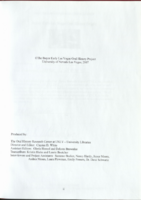
Transcript of interview with Helen Daseler by Claytee White, October 9, 2007
Date
2007-10-09
Archival Collection
Description
In this interview, Helen Daseler shared memories of mining work in Colorado, living in Europe, and working for the U.S. government, in addition to opening the "Las Vegas Day School". Helen was born in 1929 in Newton, Iowa. She matriculated at George Washington University but earned her degree from the University of California Santa Barbara. After graduation Helen married Jack Daseler who joined the "Lighter-Than- Air Program with the Navy and flew blimps along the Pacific Coast, Atlantic Coast and South America. Later, Jack worked as a teaching principal in France and Germany where their three children were born. Helen and Jack, both certified teachers, moved to Las Vegas, Nevada, 47 years ago and started the Las Vegas Day School in a Unitarian Fellowship building on Bond Road (Tropicana). The initial class started with 14 students. Helen taught kindergarten the first year, and Jack assumed the administrative and management duties. As the nineteen seventies approached, they played a major role with school integration in Las Vegas. Since Jack, the daily operations of the school are performed by the three sons, Neil, Jack, and Frank. Helen is retired and lives in Las Vegas.
Text

Transcript of interview with Chet Carrigan by Robert Kahre, February 17, 1981
Date
1981-02-17
Archival Collection
Description
On February 17, 1981, Robert Kahre interviewed Chet Carrigan (born 1912 in Texas) about his experience living in Las Vegas, Nevada. Carrigan first talks about his background in construction as well as some of his experiences in the Sheriff’s Posse before describing the major events and changes of Las Vegas that he witnessed. Carrigan also talks about his family, the effects of the Great Depression on the city, the flooding problem, and the building of Hoover Dam. He also describes the first schools in Las Vegas, means of transportation, his laundry business, and his experience on the volunteer fire department. The end of the interview involves a discussion of topics including the first movie theaters, Cashman Field, underground water, the railroads, and Carrigan’s thoughts on the future of Las Vegas.
Text
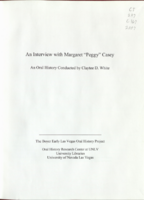
Transcript of interview with Peggy Casey by Claytee D. White, January 13, 2005
Date
2005-01-13
Archival Collection
Description
Margaret "Peggy" Casey was born in Louisville, Kentucky where her father was the city editor of the local newspaper. She grew up amidst all the excitement of the Kentucky Derby, which she recalls in the interview. Peggy attended college at the University of Wisconsin during World War II. She describes the atmosphere and what it was like during her years in college. After graduating, she worked for an aeronautical company, Curtiss-Wright, where she helped build planes for the war. By 1952 Peggy was married to Walt Casey, whom she met through her sister, and they had moved to Las Vegas. In the interview, Peggy discusses what the environment was like in Las Vegas for a woman raising children. She describes what grocery shopping was available, and how she sewed most of her children's clothing. Peggy's children got involved in different activities. Mike had asthma, and he started swimming at the Paradise Park pool, which was built around 1960. The aerobic effects of competitive swimming developed his lungs. Steve was into horses and actually delivered newspapers on his horse. Her daughter loved horses also, and owns them to this day. In 1959, Peggy joined the Mesquite Club, which is the oldest federated women's club in Las Vegas. The club planted trees, started the public library, and was involved in many worthy causes. She also became a Master Gardner and has helped in many gardening projects around the valley. Peggy gives a great account of her life in Las Vegas, and that of her family and friends. At the end of the interview Peggy gives her thoughts on Las Vegas today, comparing them to her memories of Vegas back in the 1950's and 1960's.
Text
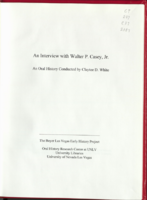
Transcript of interview with Walter P. Casey, Jr. by Claytee D. White, November 15, 2004 and January 13, 2005
Date
2004-11-15
2005-01-13
Archival Collection
Description
Walter P. Casey Jr. was born in Plandora, California, which is located in the Imperial Valley at the Southeastern tip of the California Mexico border. Walter grew up living on the farm where his father grew crops like wheat and alfalfa. In 1942 Walter graduated from the University of California Brawly, and then went on to attend Berkeley for four years. Upon completion, he went on to become a flight navigator for Pan American World Airways during World War II. During the war, the U.S. Navy contracted flight navigators for transporting services. Once Walter was finished with the Navy, he went on to work for United Airlines where he was to find business for their air freight service. In 1951, after doing that for a few years, Walter decided to move his family to Las Vegas. Walter describes Las Vegas back when there were only 50,000 people. He tells of the vibrant environment in the valley and describes some of the casinos that were around in the 1950s and 1960s. In 1954 Walter started his own business with a $6,000 loan from the Bank of Las Vegas. He personally ran the water softening business for almost forty-five years before handing it down to his son. Walter also talks about his involvement in politics. He was the chair of the Republican Party in the state of Nevada, and he also did some lobbying for the National Association of Manufactures. Towards the end of the interview Walter reflects on his marvelous life in Las Vegas and comments on the water situation in the valley today.
Text
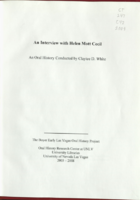
Transcript of interview with Helen M. Cecil by Claytee D. White, April 24, 2007
Date
2007-04-24
Archival Collection
Description
Helen Mott Cecil was born in 1916 and grew up in Las Vegas. Her grandparents were miners and her grandmother owned property on the Westside. She recalls a friendly neighborhood and walking back and forth to school with neighborhood children. The family moved several times finally settling at 601 South Main Street. While attending Las Vegas High School she participated in several Helldorado parades with her father and brother. At the age of 15, Helen remembers the constriction of the first downtown post office. When the Hoover Dam started in 1931, her father was the under-sheriff. One of his duties was distributing health cards to prostitutes. Her memories include Saturday night dances in Anderson's Mess Hall in Boulder City, atomic bomb testing at the Nevada Test Site walking to church services on Fremont Street, Woodlawn Cemetery, the old Henderson Townsite and meeting President Roosevelt at the Hoover Dam dedication. As a high school student she served as president and counselor in her Church of Jesus Christ of Latter Day Saints. In 1934 she graduated from Las Vegas High School. Helen held numerous jobs before getting married at the age of 26-bookkeeper, movie theatre usher, telephone operator, and secretarial work. Her husband Bill worked at all three post office locations in the Las Vegas area. At the age of 91, Helen and her sister still live and enioy life in Las Vegas sharing their many memories of early Las Vegas.
Text

Transcript of interview with Dr. Jack Cherry by Cheryl Mawhinney, March 20, 1978
Date
1978-03-20
Description
Las Vegas history from the perspective of medical care. Senator Pat McCarran aiding patients. Water. Charleston Blvd underpass. Influx of specialists beginning in the 1950s. Expansion of valley hospitals beginning in the 1950s. Southern Nevada Memorial and Las Vegas hospitals. Working in the Clark County jail. Reflections on living in Reno, Goldfield, and Tonopah. Walker Scott and Scotty's Castle. Sunday services during the construction of Scotty's Castle. Comparison of medical care between Reno and Las Vegas. Local gaming. Bugsy Siegel's mistress. Critic of modern doctors. Reno medical school.[Interview summary on file]
Text
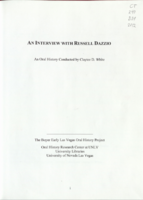
Transcript of interview with Russell Dazzio by Claytee D. White, November 4, 2013
Date
2013-11-04
Archival Collection
Description
A special note: This interview was conducted in two parts before students of the UNLV College of Hotel Administration. Mr. Dazzio serves as a member of the college's International Advisory Board. During the interview he shares stories of his path from the son of an early dealer to being twenty-something working at the Stardust with Al Sachs and Frank Rosenthal to being a cofounder of R&R Global Hospitality. It was unlikely that Russ Dazzio's father had any idea of what he was bringing his young family into when he moved to Las Vegas from Pueblo, Colorado and became a dealer in the early 1950s. A few months afterwards, five-year-old Russ and his mother stepped off the Union Pacific train to join him. They walked down Fremont Street, "a tree lined horseshoe sidewalk", to the casino where his father dealt cards. No minors were allowed, so young Russ sipped an ice cold Coke and waited. From that point on, Russ's life became entwined with the growth and evolution of Las Vegas. After graduating from Western High School in 1968, Russ became one of the first students of the Hotel College at UNLV (then Southern Nevada). His studies were interrupted by enlisting in the Army during the Vietnam War, but he returned to his studies. During this interview he recalls his career path from a thirteen-year-old bus boy at the Thunderbird Hotel for $1.25 an hour to a finding himself working closely with Stardust executives Al Sachs and Frank Rosenthal while in his early 20s. He garnered a wealth of experiences in his jump from the Strip to an international chain of successful hotels The interview is sprinkled with humorous stories and sage advice from a successful hotel operator for the ITT Sheraton chain and founding partner of R&R Global Hospitality, a third party management firm (started in 1985). This is a business story filled with the ups and downs caused by two recessions in the 1980s. Today Russ is ever-busy with projects underway. He maintains a close relationship with UNLV's Hotel College, serving on the International Advisory Board and is proud of being an alumnus.
Text
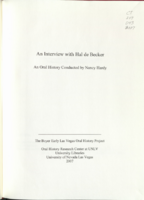
Transcript of interview with Hal De Becker by Nancy Hardy, June 23, 2003
Date
2003-06-23
Archival Collection
Description
Hal de Becker traveled the world doing what he loved: dancing. He was the product of a theatrical family that moved to Southern California allowing him to grow up with the Hollywood sign in the background. After acting in small roles, he fell in love first with classical music and then with ballet. He appreciated beauty in those art forms as well as in the physical scenery of Switzerland, France, Palm Springs, Italy, Holland, and other exquisite places around the globe where he danced. De Becker worked on stages from Lake Tahoe where he opened for Nat King Cole to a Casino Campione in the Italian Alps becoming the talk of the town and finally to the hotels of the Las Vegas Strip. As he reminisced through the years of his fascinating life, we learned that the great ballet dancers never stop practicing, always aiming for perfection. When this interview was conducted, he owned a dance studio where other dancers could go to achieve the greatness that Hal attained during his long career. Some of the funny stories of De Becker's life come from the other side of his personality, the private detective. Educated, urbane, and sophisticated, Hal De Becker is indeed a man for all seasons and a lover of the dance art form. Shall we dance?
Text
Pagination
Refine my results
Content Type
Creator or Contributor
Subject
Archival Collection
Digital Project
Resource Type
Year
Material Type
Place
Language
Records Classification
